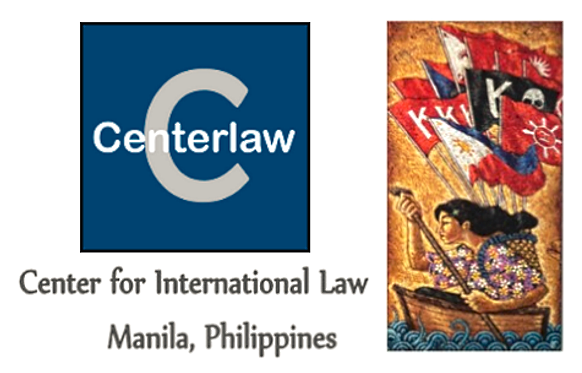The Center for International Law (CENTERLAW) on Tuesday, April 26, filed with the Supreme Court a Letter-Petition asking for the issuance a new Writ “Contra Homo Sacer” for the effective prevention and investigation of extra-legal killings in connection with the raging drug war under the Duterte administration.
According to attorneys Romel R. Bagares and Tin Antonio, the move was aimed “to implore the Supreme Court to promulgate additional rules on criminal procedure to help prevent the disturbing emergence of a class of people who – harking back to ancient Roman times – are no more than homo sacer, or beings reduced to mere biological existence, denied of all rights, marked for execution anytime and anywhere.”
In proposing the new Writ Contra Homo Sacer, Centerlaw referred to a legal concept from ancient Roman law and recovered recently by the Italian philosopher Giorgio Agamben, warning against governments that invoke public emergencies as a basis to treat certain persons as without rights such that they may be killed at any time.
Centerlaw is a non-governmental organization founded in 2004 to promote the Rule of Law in the Philippines and in the ASEAN Region through training, advocacy and strategic litigation.
The Center submitted the Letter-Petition directly to the offices of the Supreme Court en banc, where it was received shortly before 5 o’clock.
The Center’s lawyers raised an alarm over the Philippine National Police (PNP) anti-drug operation, informally referred to as Operation Tokhang, which, according to human rights groups, has already killed at least 8,000 persons in the last 10 months.
Centerlaw earlier filed a Writ of Amparo petition for the family of four men allegedly summarily executed by members of the Quezon City Police District in Payatas during a tokhang operation. A fifth victim, Efren Morillo, survived.
They said:
“The Morillo case and many others that have already been documented are a chilling example of what happens when police and other law enforcement authorities are given blanket authority – or are encouraged to act as if they have been granted one – to decide over who is a criminal and who is not, who is an enemy of the State and who is not, or who deserves to die and who deserves to live, without the restraints provided by law.”
In proposing a new “Writ Contra Homo Sacer,” the lawyers from the Center referred to a legal concept from ancient Roman law and recovered recently by the Italian philosopher Giorgio Agamben, in which a class of persons are treated as outlaws and without any rights.
In his works, Agamben warned against governments that invoke public emergencies as a basis to treat certain persons as without rights such that they may be killed at any time.
In their statement, the lawyers from the Center said their proposal aims to prevent “drug suspects or any other criminal suspects for that matter, from being treated as homo sacer and from being subject to banishment to the realm of uncertain fate. “
Centerlaw proposed to the High Court that a new mandatory inquest procedure be instituted to address deaths arising from police operations as well as from vigilante-style killings. An inquest is a summary procedure conducted by the public prosecutor to determine if a crime has been committed in connection with a killing.
This will require on the part of police a full documentation of any operation, from planning to its implementation and its aftermath.
This includes the mandatory submission of detailed reports, forensic evidence, autopsy reports and the like, that comply with international standards. Many of these documentary requirements, while already provided under existing rules of the Department of Justice and the Philippine National Police (PNP), are often ignored by authorities.
Thus, to ensure full compliance by both public prosecutors and law enforcement agencies, the Center asked the High Court to incorporate them into an amendment to the Rules of Criminal Procedure or into a new class of protective writs similar to what it had earlier issued, namely the Writ of Amparo and the Writ of Habeas Data.
Centerlaw said that under Art. 125 of the Revised Penal Code, police officers have the duty to deliver to proper judicial authorities a detained person within prescribed periods of law, and that any failure to perform said duty will amount to a crime.
“The reason behind Article 125 is to have the grounds of arrest and the imputation of crime made by police officers reviewed independently by judicial officers. This is a fundamental safeguard for citizens against abuses of police officers who may become accusers, prosecutors, judges, and executioners rolled into one. “
It said Article 125 should not be applied only in instances when the accused is arrested and detained alive.
“The obligation of police officers to turn over records, documents, and all evidence in connection with the commission of a crime as they themselves allege, must be required all the more if the suspect ends up dead, either at the hands of police officers or unknown assailants,” the Center said.
Under the 1987 Constitution, the Supreme Court is uniquely empowered to issue new rules for the protection of constitutional rights.
The Center said in crafting the “Writ Contra Homo Sacer”, the Supreme Court may adopt international standards laid down by the UN Minnesota Protocol on the Effective Prevention and Investigation of Extra-Legal Killings, Arbitrary and Summary Executions, Enforced Disappearances and Torture.










